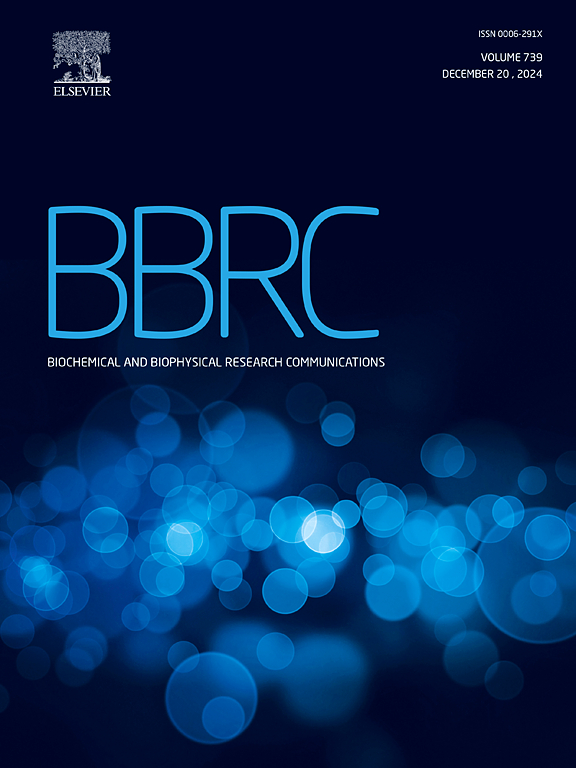Effect of chronic corticosterone administration on acute stress-mediated gene expression in the cortex and hippocampus of male mice
IF 2.5
3区 生物学
Q3 BIOCHEMISTRY & MOLECULAR BIOLOGY
Biochemical and biophysical research communications
Pub Date : 2025-03-31
DOI:10.1016/j.bbrc.2025.151729
引用次数: 0
Abstract
Corticosterone plays an important role in the stress response, physiological regulation, and development of stress-related psychiatric disorders. Although several studies have demonstrated that chronic corticosterone induces anxiety- or depressive-related behaviors in mice, it remains unclear whether chronic corticosterone administration affects gene expression in the brain during the stress response. This study investigated whether chronic corticosterone administration has a significant effect on stress-related gene expression in the brain. Therefore, mice were chronically treated with corticosterone in drinking water and gene expression was analyzed by quantitative PCR (qPCR). Moreover, restraint stress was acutely applied as a novel stressor in mice chronically treated with corticosterone in the cortex and hippocampus. We initially found that chronic corticosterone administration altered glucocorticoid signaling-mediated gene expression, such as FK506 binding protein 5 (Fkbp5) and glucocorticoid-inducible kinase 1 (Sgk1), in the cortex and hippocampus of mice. Next, we found that restraint stress exposure elevated Fkbp5 expression in the vehicle group; however, chronic corticosterone administration occluded further induction of Fkbp5 expression after restraint stress exposure. In addition, pro-inflammatory cytokines tumor necrosis factor α (Tnfa) and interleukin-1β (Il1b) mRNA expression in the cortex and hippocampus were remarkably enhanced by restraint stress in corticosterone-treated mice, but not in the vehicle group. Collectively, our results demonstrated that chronic corticosterone administration modulates glucocorticoid signaling and uncovered the robust induction of pro-inflammatory cytokines after restraint stress exposure in chronically corticosterone-treated mice. These mechanisms may be involved in the molecular basis for the onset of stress-related mental illnesses.
慢性皮质酮对雄性小鼠皮质和海马急性应激介导基因表达的影响
皮质酮在应激反应、生理调节和应激相关精神疾病的发展中起重要作用。尽管有几项研究表明,慢性皮质酮会诱导小鼠的焦虑或抑郁相关行为,但目前尚不清楚慢性皮质酮是否会影响应激反应期间大脑中的基因表达。本研究探讨了慢性皮质酮给药是否对大脑中与压力相关的基因表达有显著影响。因此,小鼠长期饮用皮质酮,并通过定量PCR (qPCR)分析基因表达。此外,在皮质酮长期治疗的小鼠中,抑制应激作为一种新的应激源在皮质和海马体中被急性应用。我们最初发现,慢性皮质酮给药改变了小鼠皮质和海马中糖皮质激素信号介导的基因表达,如FK506结合蛋白5 (Fkbp5)和糖皮质激素诱导激酶1 (Sgk1)。接下来,我们发现约束应激暴露提高了Fkbp5在载具组的表达;然而,慢性皮质酮抑制应激暴露后Fkbp5表达的进一步诱导。此外,皮质酮组小鼠皮质和海马区促炎细胞因子肿瘤坏死因子α (Tnfa)和白细胞介素-1β (Il1b) mRNA的表达在抑制应激下显著增强,但在载药组无明显差异。总的来说,我们的研究结果表明,慢性皮质酮给药可调节糖皮质激素信号,并揭示了慢性皮质酮治疗小鼠在限制性应激暴露后促炎细胞因子的强大诱导。这些机制可能与应激相关精神疾病发病的分子基础有关。
本文章由计算机程序翻译,如有差异,请以英文原文为准。
求助全文
约1分钟内获得全文
求助全文
来源期刊
CiteScore
6.10
自引率
0.00%
发文量
1400
审稿时长
14 days
期刊介绍:
Biochemical and Biophysical Research Communications is the premier international journal devoted to the very rapid dissemination of timely and significant experimental results in diverse fields of biological research. The development of the "Breakthroughs and Views" section brings the minireview format to the journal, and issues often contain collections of special interest manuscripts. BBRC is published weekly (52 issues/year).Research Areas now include: Biochemistry; biophysics; cell biology; developmental biology; immunology
; molecular biology; neurobiology; plant biology and proteomics

 求助内容:
求助内容: 应助结果提醒方式:
应助结果提醒方式:


